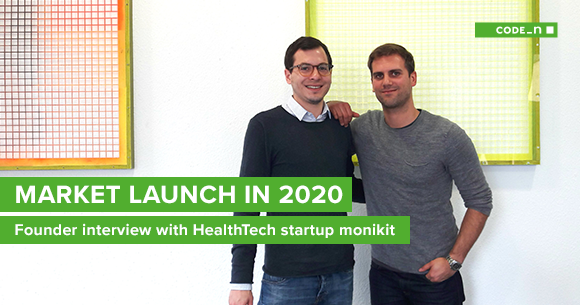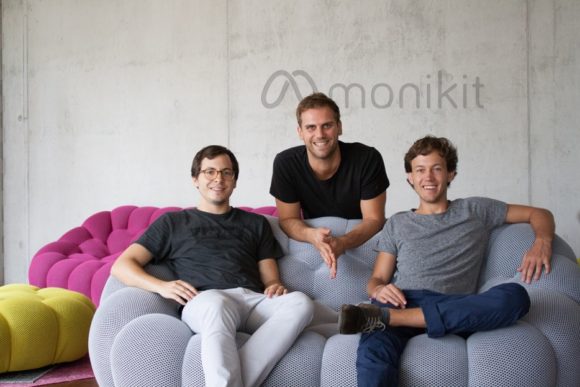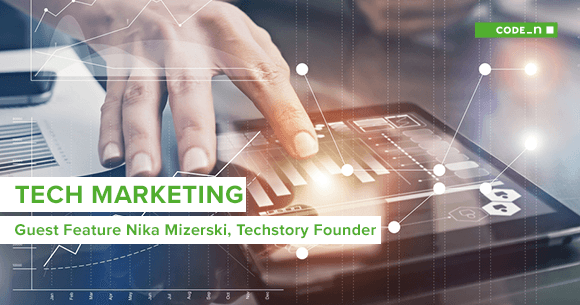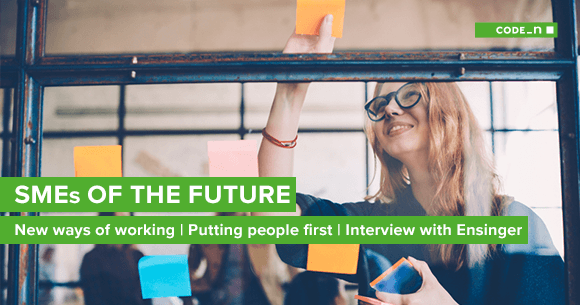“HealthTech is going to change our society” | Former CODE_n residents from monikit talk about their high-tech wearable for epileptics
Today we’re psyched for a special reunion! Our former residents from HealthTech startup monikit are visiting us again at CODE_n SPACES and have a lot to share. Founding duo Florian Lutz and Kevin Klett and their team were located on the Innovation Campus until November 2016, pouring their passion into a project to develop a wearable device that will help epileptics prevent seizures and manage their condition more effectively. When they were ready to take the next step in product development several months ago, the ambitious team moved to the University Hospital in Tuebingen, where they can test the system on patients suffering from epilepsy. Their aim is to finalize product development and launch their device as a smartwatch in the near future. In this exclusive interview, the co-founders brought us up to speed on when their smartwatch will hit the market, the hurdles that can crop up when developing medical devices, and why their small startup took the leap despite these difficulties. As always, we’ll ask the founders to give us some insights into the ups and downs on their startup rollercoaster, the challenges they face, and their top three tips for anyone who’s thinking about starting their own business.

1. Hi, Kevin and Florian.We’re so glad you’ve come back to see us at our SPACES so we can catch up on what you’ve been doing!Can you just quickly remind our readers – what’s the business idea behind monikit?
Kevin: Hi, Lisa! We’re really psyched to be here, too! To answer your question, monikit provides a helping hand for people with epilepsy. We’re developing a wearable device, a smartwatch, that assists them in everyday situations – recognizing seizures and contacting family members, caregivers, or doctors so appropriate measures can be taken. At the same time, monikit serves as a system that helps physicians offer more effective treatment – like adjusting meds – by providing them with comprehensive information about the patient.
Right now the product is still in the development phase, which lasts a bit longer for medical devices than conventional products. You have to produce clinical studies before you can put a medical product on the market. That means we have to test monikit first on patients and analyze a lot of data before we can actually launch it. And on top of that there’s certification, which is very strictly regulated. It all adds up to a lot of time and effort, and gobbles up financial resources. As a HealthTech startup, the amounts of capital you have to line up to get your product on the market are a lot higher than, for example, what a software company would need.
Florian: Bringing a business idea to the finish line in the HealthTech sector is a lot tougher than we originally thought! We’re working with things like neuronal networks and machine learning – all based on data. And we have to look separately at the patient data for every single patient to draw individual conclusions. So of course that makes product development a long process. Just coming up with an MVP (minimal viable product) and taking it to market quickly is not an option in this sector. We’re using a monitoring unit for epilepsy patients at the University Hospital in Tuebingen, which offers us the perfect environment for doing our testing and processing the data.
2. So what stage of development are you at right now?
Kevin: This year we’re still going to be putting work into R&D. We’re planning the prototype for next year, and we assume we’ll be able to complete the market launch in 2020.
3. How are you bridging the financial gap in the meantime?
Kevin: So you do need more money to launch a product in the medical sector than in others, but there are also incredible amounts of other funding available in this industry! As things have moved along, of course we’ve also been in contact with VC and private equity firms – but we found out pretty quickly that venture capital is not really what’s needed at this stage of the game. Right now those firms are still holding back, because they see us as a risky proposition in this early phase. But when it’s time for the market launch, it’ll make sense to raise capital that way.
4. Do you work on monikit full time?
Florian: Yeah, we’ve been giving 100% of our time to monikit since day one – which was possible because we’ve had funding since day one!
Kevin: From the very start, we’ve been open to advice and ideas from others. It was pretty early on that we took part in a MedTech Startup School accelerator program, which hooked us up with some important contacts. And it also put us in touch with our target group and let us validate the product/market fit, which of course gave us huge impetus.

Florian Lutz (Co-Founder), Kevin Klett (Co-Founder) and Julian Hofmeister (Data Scientist) of monikit. (image: monikit)
5. What’s keeping you particularly busy these days?
Florian: For one thing – as you can probably guess – generating a lot of data. At the moment we’re also dreaming about doing a multicenter research trial. But it’s not financially feasible right now. The second thing we’re focusing on is, as always, the hardware, which still needs a lot of fine-tuning. Getting clear signals in everyday scenarios still poses a big challenge – but that’s a problem that affects a lot of other people as well. And the biosignals of individual patients remain highly unique; every one of them sends different signals. So that presents us with the challenge of whether it’s possible to find an algorithm that applies universally or if we have to develop separate, patient-specific ones.
6. What’s been the biggest challenge so far in getting your company off the ground?
Kevin: Like most startups, we’ve had our share of issues. Finding the right people isn’t easy, especially for algorithm development. It’s unbelievably tricky for a startup to find someone in that field, because unlike Daimler or Bosch, our pockets aren’t deep enough to afford huge salaries. And employees have to be able to live with the fact that it’s a risky venture, that we might not be around this time next year. At the same time, everyone who works for a startup has to give 120%. These three factors keep making it hard to find people who are a good fit, but we’ve been lucky enough to bring the right ones on board.
Florian: You need people in your team who share your passion – in this case, developing a medical device – and of course who have enough staying power.
7. Until recently you were residents at CODE_n SPACES,but now you’ve moved monikit back to the University Hospital in Tuebingen.How did that happen?
Florian: Starting in September 2016, we were able to spend three months at the CODE_n SPACES Innovation Campus. We really loved our time here – batting around ideas with other startups was especially good for our growth. But since our patients are at the University Hospital Tuebingen, we had to relocate there – driving back and forth every day wasn’t an option. At the hospital and the adjacent Hertie Institute for Clinical Brain Research, we can generate the data we need for product development, and at the same time, we’re directly at the source of new scientific information.
8. Can you talk a bit about your experience working at CODE_n SPACES and with the community here?
Kevin: Like Florian said, it was amazing to be able to talk things out with other startups. Even though we’re in different fields, everyone who’s trying to start a new company has similar problems. So sometimes it really helped – you’d be shooting the breeze with someone and find out that you aren’t the only one who’s had to deal with a certain issue. “We totally had the same problem, but don’t worry, you’ll get there” – it’s super-motivating to hear something like that. Plus the events at CODE_n really helped us take things to the next level – I’m thinking specifically of the new.New Festival, where we were able to forge valuable contacts to B.Braun and Aesculap. So we’d say it’s extremely important to make contacts and build a network, even in the development phase.
Florian: Right – the entire focus of a startup can’t just be on developing your product until it’s ready for launch. You also have to share ideas and continue to grow. For example, we regularly had amazing conversations with the guys from CODE2ORDER about our lives as startup founders – tell them we said hi! 😉 There are a lot of challenges that we couldn’t have even imagined at the beginning, but when they do pop up, it’s great to have a sparring partner sitting right next door!
9. How do you think the HealthTech sector will develop in the age of digitalization?What role will wearables play?
Kevin: I’m 100% convinced that HealthTech and e-health will not only be one of the most important growth markets, but also the sector that is going to change our society in the long run. Today we have more and more opportunities to collect data from patients and learn more about the individual patient. So in the long term, we’ll be able to provide better treatment support. It’s a win-win situation for the patients and the doctors and nurses, because it will do some of their work for them. The healthcare industry is on the threshold of major change, and I believe it will be for the better.
Florian: Right now there’s a lot of public skepticism about things like transmitting personal data to health insurance companies. We’ll see where that goes in the next couple of years. But I think no one would argue that it’s not an incredible growth market.
10. What are your top three tips for new entrepreneurs or anyone who is thinking of starting a company?
Kevin: #1 Ask for feedback and take it seriously. Back in the day, I thought you shouldn’t be afraid to make mistakes, because that’s how you learn the most. But now I’ve shifted my position a bit: it’s better not to make the mistake in the first place, if only because that idea’s getting to be a bit of a cliché ;)! Of course you can’t always avoid mistakes, and it’s okay as long as you learn from them. But it really is better if you can do things right the first time! So my actual tip is to be open to other opinions. That’s my biggest insight as an entrepreneur – talk to other people about your problems. You should listen to advice with a healthy degree of skepticism, but do take it seriously.
Florian: #2 Take advantage of third-party funding. There’s a crazy amount of funding out there, at least in Germany, and if you can tap into it you can stay relatively financially independent over the years and develop your product without venture capital. Before you launch into countless VC pitches, you should look around at different sources of funding that might be available to you. I think that a lot of entrepreneurs underestimate this option for accessing capital.
Kevin: #3 Put together the best team you can. Your company is only as good as your team. You’ll need a top team to bring a great product that customers will love to market. So be choosy and take your time when you’re hiring employees. By now we’ve developed our own method for finding good IT people – we grab them straight from the university before the big corporations can get their hands on them!
11. And where is your journey going – where do you see yourself in five years?
Five years from now our monikit product will have been on the market for two years already and our team will have reached the double-digits. We’ll be far enough along in five years to be thinking about going international with a product that offers reliable support to patients. With an eye to moving into the market, we’re already lining up our distribution channels today. We’ve forged good contacts to health insurance companies and pharmaceutical corporations, who’ve already signaled their interest. But at the end of the day, it’s the physicians that recommend medical devices to their patients. We believe that having the right product design to embody the right lifestyle is also an important aspect of appealing to patients. It’s our vision that patients will come to their doctors and say “I want a monikit!”
Kevin, Florian, thanks for the interview! It’s always interesting to hear what you’re working on – we think it’s definitely worthy of support! We’re looking forward to keeping in touch and hearing the news when the first monikit prototype sees the light of day.
Are you interested in more hot trends from the up-and-coming field of HealthTech? We’ve got you covered! Get the fascinating scoop here on how our new residents BABYBE medical help premature babies in incubators experience the heartbeat and pulse of their mothers. And our alumnus cosinuss° is currently developing a new high-tech wearable that will help keep kids from experiencing febrile convulsions. This article gives you the full story. We’ve got our finger on the pulse of the HealthTech industry for you – so keep checking in to get updates on the latest trends and developments!





Comments